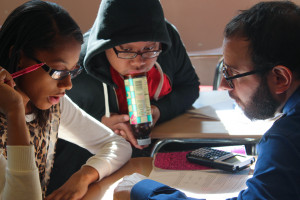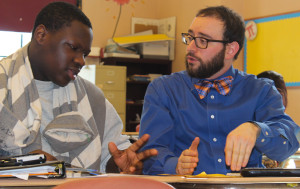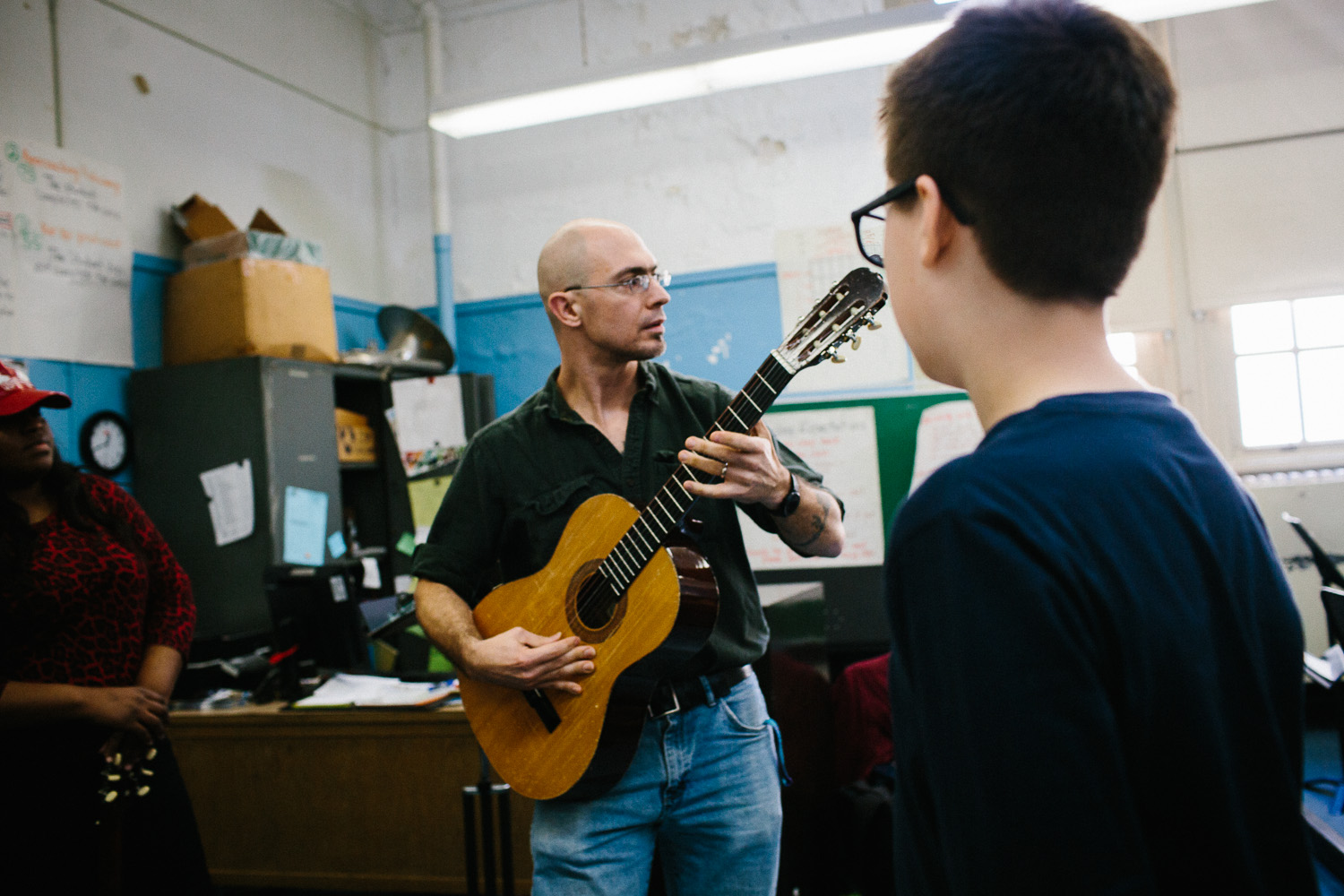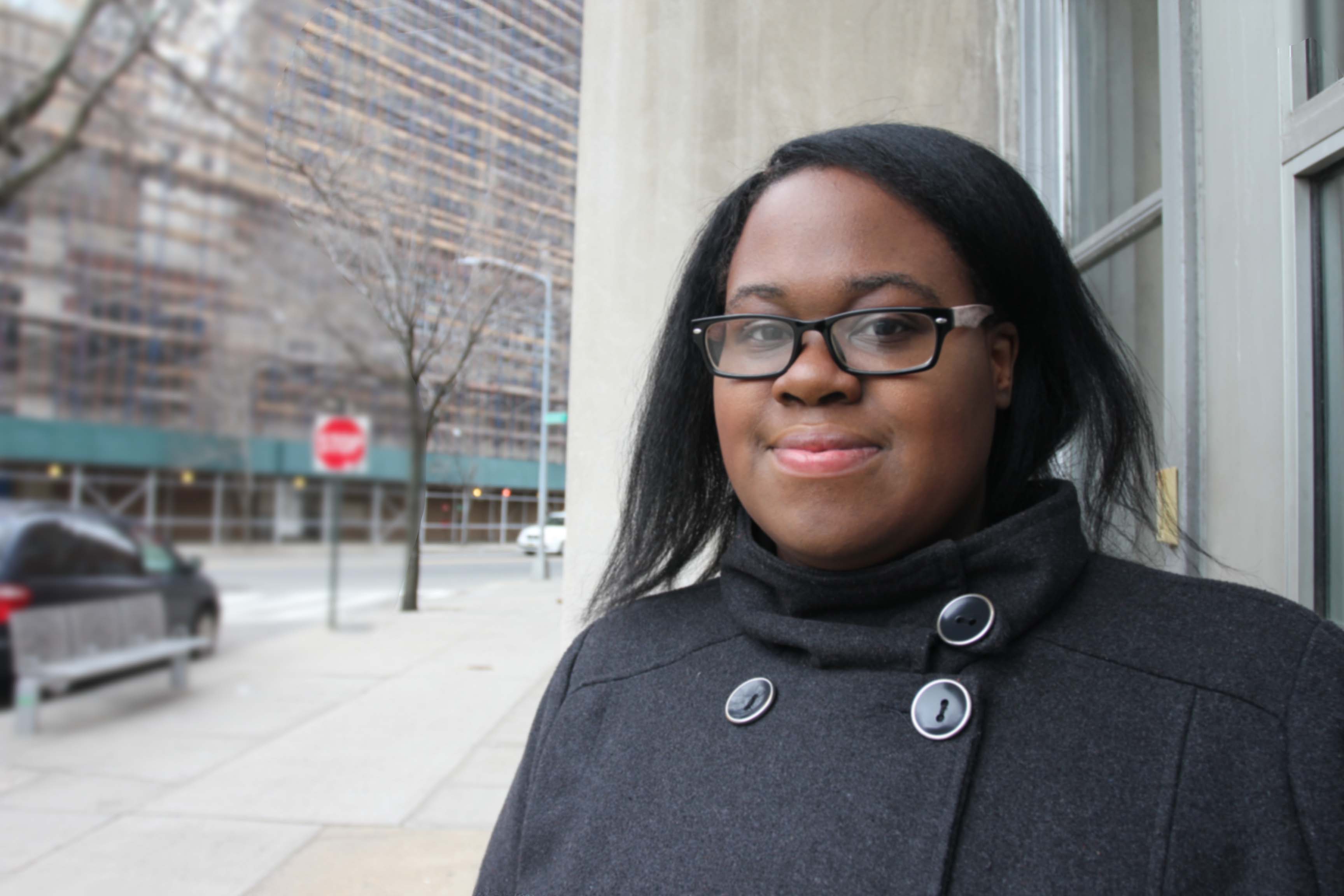
Dan Berkley’s voice rose with each second ticking down on the Smart Board timer.
“I hear way too much talking that has nothing to do with what you’re working on,” he yelled over the din. “You have tests coming up after you come back from break. You have a quiz at the end of the week.”
The chatter dropped briefly only to rise again moments later.
Berkley used to get attention by donning a wig and red, bulbous nose and taking pratfalls and a random pie in the face.
That was before he exchanged the big top for a high-school classroom. Now, at 32, the clown turned teacher struggles to connect with audiences of 30-plus students five periods a day, five days a week with occasional night classes and weekends thrown in.
A neatly trimmed beard and a pocket full of pens and pencils are his workday toolkit.
“The stakes were a lot lower being a clown,” Berkley said. “I had to make people laugh. So what if they didn’t? Kids’ lives are at stake here.”
Berkley teaches physics at Pathways in Technology Early College High School or P-TECH, a six-year program from which students graduate with an associate degree in applied science.
Only three years old, P-TECH has gotten lots of attention. President Barack Obama praised the school as the future of the U.S. economy in his 2013 State of the Union Address. In January, Gov. Andrew Cuomo called for 10 new schools statewide modeled after P-TECH in his 2014-15 budget proposal.
The school is located in Brooklyn’s Crown Heights neighborhood, across from the crime-plagued Albany Houses complex. The community is nearly 80 percent African-American, 13 percent white and seven percent Latino. The median income is just under $40,000 a year.
Every day, students drop off their cell phones at a nearby convenience store before passing through a metal detector and undergoing an occasional wand search to get to class.
Berkley took the roundabout route to Crown Heights. He has a bachelor’s degree in physics with a minor in mathematics from Bates College in Maine. He spent the summer of his sophomore year as a counselor at a circus camp and the following summer as a research intern at the Massachusetts Institute of Technology’s Plasma Science and Fusion Center. He learned two lessons: being a circus performer “was a viable career path” and “research was interesting, but not something I wanted to do year after year.”
He spent the next eight years clowning, including two years with Ringling Bros. & Barnum and

Bailey’s Circus, and teaching the art to others before deciding to join the New York City Teaching Fellows program. Berkley is one of a growing cadre of talented, young professionals following this alternative path to teaching in one of the nation’s largest and most racially segregated public school systems.
The 14-year-old program is one of several hundred nationally designed to fast-track mid-career professionals, particularly those with backgrounds and degrees in science, technology, engineering and math, into the teaching profession and into hard-to-staff, high-poverty urban schools. An estimated 8,700 New York City Teaching Fellows are currently working in the city school system.
After six years as a freelance performer and clown coach, Berkley said he began missing science and thought “teaching science would be a merger of the two things I enjoyed.”
“I liked the teaching fellows program not only because it provided me with a subsidized master’s degree and I ended up in the classroom pretty quickly, but it also helps you find places where you’re really needed,” he said. “That really appealed to me, being somewhere I was needed.”
Berkley’s parents, both retired teachers, supported his career swap.
“Comedy is a serious business the way he sees it,” said Berkley’s father, Roger. “One of his hopes when he decided to teach is that some of those skills can be transferred to teaching physics.”
Berkley became a teaching fellow in June 2012. For five intensive weeks, he took two graduate courses daily and spent mornings student teaching at a summer school.
“It was teaching boot camp,” he said. With just weeks of student teaching under his belt, he was out interviewing that August and landed his first job as a physics teacher at P-TECH, which was entering its second year of operation.
When school opened, Mr. Berkley, as his students call him, faced his most challenging audience yet: 102 students, with wide-ranging academic skills, who, in keeping with the school’s philosophy of introducing students to physics as their first science, were all in his class. He was the school’s first and only science teacher that school year.
Berkley said he didn’t think about the lack of student teaching experience in the beginning, but “in retrospect, it made things a little more difficult just because I was a new teacher.”
Brian Lewis, 24, a second-year math teacher at P-TECH, volunteered to co-teach the class with Berkley. He interviewed him before Berkley was hired. “We only had a few candidates. Dan was one of them,” Lewis said. While the other candidates were “very traditional with lots of years of experience, they didn’t seem like they’d connect with the kids the way Dan might.”
Lewis has a master’s degree in math education from New York University. He, too, is a graduate of a fellowship program – Math for America, whose goal is also to turn out high-school science, technology, engineering and math teachers to work in public schools. He received a full year of student teaching as part of his education.
Berkley and Lewis have very different recollections of that year co-teaching.
“Because of my performance background, being in front of the class wasn’t really so bad,” Berkley said. “He had experience with that group of kids. I had ideas of how I wanted to run the classroom. We agreed on a lot of things.”
Lewis recalled an awkward start to the year. “I really didn’t know Dan that well,” he said. “I didn’t know the schedule right away. I didn’t really know physics. I didn’t know what I was getting myself into. I knew there were 100 some kids. I didn’t know every single student was going to be put into physics.”
“Dan came to the classroom with not a lot of teaching experience,” Lewis said. “He was not prepared for the gap between what you think students at this level know and what students at this level actually know. It was a shock for him. It was a shock for me, too, when I discovered it.”
Berkley viewed the class as his audience. “Performing is being able to read the audience and find the pacing,” he said. “You start off at one pace, then you realize this audience moves a little slower or this audience really enjoys this sort of thing, so I’m going to change my act a little bit more.”
Berkley juggled clubs for a lesson on projectile motion. He created a mock circus arena in the middle of his classroom, stretching a tight rope six inches above the floor for students to experience the sensation of being in and off balance.
Thoughtful questions and helping a classmate earned students a chance to throw a pie in the teachers’ faces. “They were made of shaving cream,” Berkley said, estimating he’d taken a few thousand of them while clowning.
Just when Berkley and Lewis were getting the hang of co-teaching, the school’s principal threatened to cancel the class when every student failed the physics Regents exam that winter.
They were caught off guard by the administration’s decision to test students before they had a full year of instruction. “We didn’t get through half the material by January,” Lewis said. “We had hoped we had until June.”
Berkley and Lewis were separated for this school year. On his own with a new crop of students, Berkley doesn’t have time for incorporating his old tricks into the new lesson plans. The school’s philosophy of test early, test often means students have a lot of ground to cover between state Regents exams.
Berkley is teaching first-year students. He spends class time in constant motion, visiting each desk, stooping to be on eye level with each student he addresses.
The school has added a second physics teacher. Scott Pecorino, a 16-year veteran, taught physics at Jamaica High School in Queens before the school was shuttered by the city last year for under performing.
Gregarious, with a mane of white hair, he stands out among the young staff. Pecorino is working with Berkley on coordinating lessons, and he offers him feedback on everything from time management to engaging students and classroom management. They meet twice a day “to talk about what worked; what didn’t. What kids did in one period and what they didn’t do,” Pecorino said.
Pecorino sat in the back of one of Berkley’s classes recently, supporting his colleague at the front. Despite the presence of two teachers, students’ focus was straying.
“I can see when I’m losing a bunch of students –they’re not all with me,” Berkley said. Sometimes that’s because I start talking about something that’s outside their realm of experience; sometimes because they don’t find it interesting.”
He cited a lesson about a boat moving perpendicular to a river. Its engines were pushing it across, yet it still moved down stream just a little. “It became clear almost all the students had no idea about that because they had no experience with boats or streams for that matter,” he said. So, he switched to an example of being buffeted by the wind on a really blustery day. “They picked up on what is happening because they have lived that.”
“When you’re new at any sort of experience or task, there are tools that you see, but you don’t fully understand how to use,” he said. “ There are things that I’m aware of that I do, but I feel like I haven’t fully mastered. It’s a matter of experience and that takes time to develop.”



